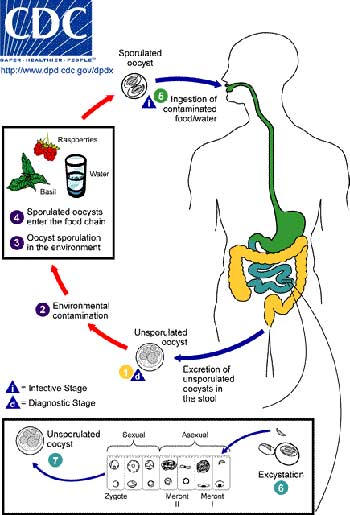With little information, one of the two cyclospora outbreaks had increased again to at least 126 sick, adding seven more patients in just one day according to the FDA’s Outbreak Investigation Table.. And while traceback has begun, at least one on-site inspection launched, samples collected, and analysis initiated, the public still does not know what food has caused this outbreak.

Most of these outbreaks are caused by contaminated produce. Previous cyclospora outbreaks have been linked to fresh basil, bagged salads, mesclun lettuce, cilantro, raspberries, and Del Monte vegetable trays. Unfortunately, sometimes a source is never identified.
The cyclospora parasite undergoes a very specific life cycle that makes it infectious. The oocysts are deposited on produce through feces, as they are excreted as unsporulated, or noninfectious, oocysts. When they are deposited on food, they can “attach” because they are sticky and difficult to rinse off. They then sporulate within one to two weeks, depending on environmental conditions, and become infectious.
People eat the produce that contains the sporulated oocysts. They excyst, or emerge, in the human gastrointestinal tract. The sporozoites invade the wall of the small intestine, undergo asexual multiplication, and mature into oocysts, which are shed in stools, completing the cycle.
And while the cyclospora parasite is not endemic in the United States, cyclospora outbreaks have been occurring regularly in this country since 2013. While some produce infected with the parasite is imported, much of it is grown right here. The government has been emphasizing farm food safety programs, both here and abroad, in the hopes of reducing these outbreaks.
Symptoms of cyclosporiasis, the illness caused by this parasite, include explosive and intermittent diarrhea, bloating, gas, painful abdominal cramps, weight loss, and loss of appetite. Patients can often be confined to their homes for weeks or months. There is a treatment for this infection, but since it is sulfa-based, anyone allergic to that drug can’t be treated.
If you have been experiencing the symptoms of this infection, see your doctor. You may have to ask for the test for cyclosporiasis, since most doctors do not routinely order it. You may be part of one of these cyclospora outbreaks that keep growing.

If you or a loved one have been sickened with a cyclospora infection, please contact our experienced attorneys for help at 1-888-377-8900 or 612-338-0202.




